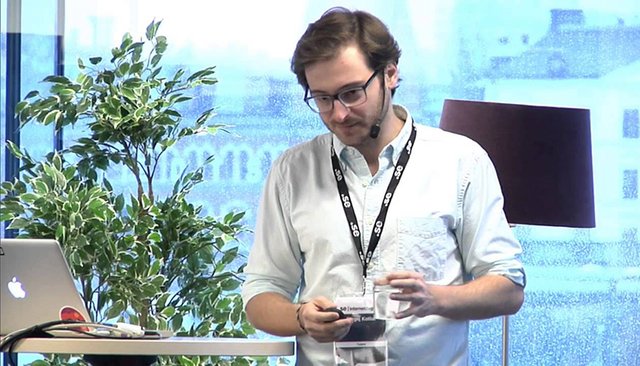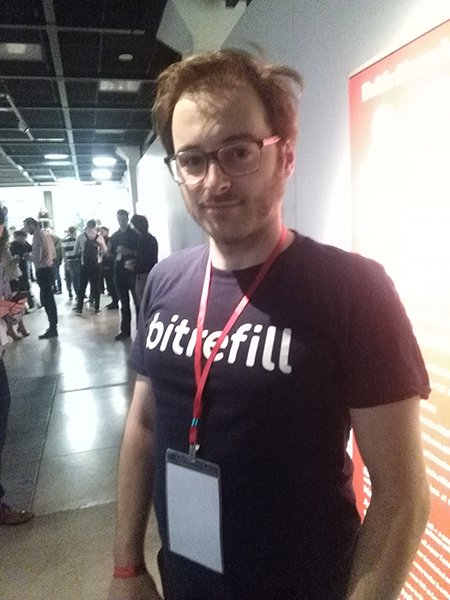Bitrefill CEO Sergej Kotliar: Bitcoin’s Future is Very Bright

Sweden-based bitcoin startup Bitrefill focused on topping up mobile phone accounts and selling gift cards has garnered some attention from the community in the recent months after implementing some innovative solutions.
Thus, back in 2017 the project’s team actively supported both bitcoin scalability solutions developed by the Bitcoin Core team and the user-activated softfork.
Moreover, in no small part thanks to the Bitrefill’s team efforts, the first ever block over 1 megabyte was mined in August after SegWit activation. And when Steam removed bitcoin payment options in December, Bitrefill was there to offer an alternative method of topping up accounts at this leading gaming platform.
Another intriguing news from Bitrefill came when the company’s developer Alex Bosworth announced the first Lightning transaction on bitcoin mainnet to pay for his mobile bill.
Alex Bosworth
@alexbosworth
Mainnet Lightning Network paying my actual phone bill with actual Mainnet funds on @bitrefill. Speed: Instant. Fee: Zero. Future: Almost Here.
6:28 AM - Dec 28, 2017
ForkLog talked with Sergej Kotliar, Bitrefill CEO, about the company’s views on the market and ecosystem of bitcoin, the company’s specific features, and the future of cryptocurrencies.

ForkLog: How did Bitrefill start? What made you come to this market segment?
Sergej Kotliar: It started in a very usual way: we just wanted to experiment with bitcoin and find out if there was a chance of selling something without physical supplies. It concerned digital goods: mobile top-ups and gift cards. Initially, it was a minor experiment but even then we received orders from countries like Bangladesh or African nations. We started realizing the prepaid phone industry covers billions of people all over the world. In some countries it’s the only thing one can do with bitcoin these days. Yes, one can exchange it for altcoins, however, when it comes to local services somehow involving local currencies, we are the only ones available in some countries after three years in operation. So it went on that way. We started studying the industry more thoroughly, as well as what it takes to operate in a certain country.
ForkLog: How does it work on technical level? Do you conclude contracts with local mobile carriers?
Sergej Kotliar: We have several different sources enabling us to maintain the connection yet we have nothing to do with any mobile carrier. In most cases they even have no idea we exist. Frankly, they shouldn’t care as we make all purchases via intermediaries. If we compare it to actual cards, it’s the same as scratch cards but the scratch code is replaced by digital refilling of accounts. More particularly, every country has its distributor companies connected to the carriers. There are international companies connected to such local distributors, and that’s how we work. It’s a continuing process of finding new partners, and we do our best to find the best prices, terms and conditions as our ultimate goal is to eliminate fees from those services around the world.
ForkLog: And how does it work for you?
Sergej Kotliar: I think we have covered around 60% of the planet so far. Say, if you’re in Ukraine and want to send 100 hryvnias to your account it will cost you 100 hryvnias. Ukraine might be a special case here as local payment terminals charge fees in most cases. So it’s what we’re aspiring to do: provide prices of local offices and remove all fees.
ForkLog: As far as I know, now it can be done with altcoins as well.
Sergej Kotliar: Yes, we added altcoin support though initially it was done via ShapeShift. Now we’re creating our own altcoin infrastructure. The problem with ShapeShift is that everything has to be converted into BTC and users still have to pay for transactions. Even if you use Litecoin, you still pay for Bitcoin transactions, and it kills the very reason to integrate altcoins. For those reasons, we’re building our system to batch the payments and eventually make payments cheaper to end users.
ForkLog: With bitcoin’s recent price rally and consequent appreciation of fees, haven’t you seen some customer outflow?
Sergej Kotliar: Yes, there was a certain decline. For that reason, we’re creating new features to attract customers. There is a new account system where one can refill the account and make transactions via the same address. It’s all operational though localization isn’t fully available. Anyway, when it comes to platforms focused on microtransactions, we’re among the industry leaders.
ForkLog: Bitrefiil was also among the first companies to add SegWit support in August 2017.

Sergej Kotliar: Yes, and it’s hardly surprising. What is surprising is that so many companies haven’t done it so far. Some even make users pay for transactions. Of course, they may have less incentives to save their customers’ money. Still, many of them cried they wanted the hardfork even though activating SegWit is no big deal. I personally saw how it happened: in our company, it was done by an intern. It did not take him much time, just under a week, which is impressive considering he was a rookie and had little idea as to the way our platform worked.
SegWit doesn’t take much effort, so the fact that major companies don’t want to do such a small thing that could benefit everyone, including users, doesn’t say good things about them. Just imagine Coinbase removes a half of resources currently occupied by their transactions in bitcoin’s blockchain: it would have changed a lot. First of all, there will be place for other players on the market.
It’s an interesting situation per se: we considered ourselves a small startup that does what it can and doesn’t embark on innovations. Now, we realize we can easily do some things and push innovations forward.
ForkLog: The community seems to have appreciated your efforts. You even became the company of the day when the first block over 1 megabytes was mined.
Sergej Kotliar: There is a lot of fake information in the community. It’s not always intentional: some just have read something on Reddit and believ it, so the nonsense starts spreading. All we can do is to show: here we activated SegWit and it saved us a half of our money.
ForkLog: Could you provide a particular example to depict those advantages?
Sergej Kotliar: The first thing one has to understand is the batching process. We batch lots of transactions from different users into one big transaction. Separate transactions would be too expensive but batching cut our expenses in half instantaneously. It’s all very important to our users. There are customers from countries like India or Bangladesh where an average transaction doesn’t exceed 1 Euro, and is usually about 20 or 30 cents. It’s probably not the best business model but we don’t want to exclude them as our goal is to enable people to use bitcoin at home and in their home country.
ForkLog: Anyway, most transactions are probably executed in bitcoin. Are there any stats regarding altcoins? For instance, what’s the second most popular coin?
Sergej Kotliar: Of course we have some stats, however, due to the issues we have with ShapeShift, I’d better answer this question once we have integrated our own solution. Still, it’s mostly about Ethereum, Litecoin, and Monero. There’s also Bitcoin Cash, we’ll add support for it as well.
ForkLog: The community is torn apart by debates on bitcoin’s evolution. How do you envision its future? Is bitcoin really becoming more a store of value, contrary to the means of payment as depicted in Satoshi Nakamoto’s whitepaper?
Sergej Kotliar: We envision a bright future. Bitcoin is only starting, and everything will find a resolution. Of course, these days we speak of cryptocurrency mostly as of a store of value but I believe it will change soon. We experiment with Lightning Network and everything is more or less ready. We actively engaged regular users in testing the protocol and sent 20 Euros to their accounts for those purposes. One can download the app now and do it for their own pleasure.
ForkLog: May I assume that you’ll be the first just like in the case of SegWit?
Sergej Kotliar: Most certainly, we’ll be the first here as well. If we don’t, we’ll be the second, and on the very same day. If not us, then who? Major companies, due to their cumbersome nature, are already losing. They can’t see the generations are changing and the Silicone Valley is losing its positions. Take a look at Coinbase: they put their stakes on Ethereum and institutional investors. Xapo is moving the same way. Users, however, need new services, new wallets, and new solutions. The very first day Lightning Network is available, we’ll activate it. The next day we’ll recommend our users to switch to wallets that support it.
So, the future is very good and bright. There will be Lightning Network and other smaller scalability solutions. I see nothing bad in the schism of the community: those who wanted to go a different way got their own coin and now they are experimenting with it. We don’t think it’s the best way but still we wish them luck.
https://thebitcoinnews.com/bitrefill-ceo-sergej-kotliar-bitcoins-future-is-very-bright/
Your Post Has Been Featured on @Resteemable!
Feature any Steemit post using resteemit.com!
How It Works:
1. Take Any Steemit URL
2. Erase
https://3. Type
reGet Featured Instantly – Featured Posts are voted every 2.4hrs
Join the Curation Team Here